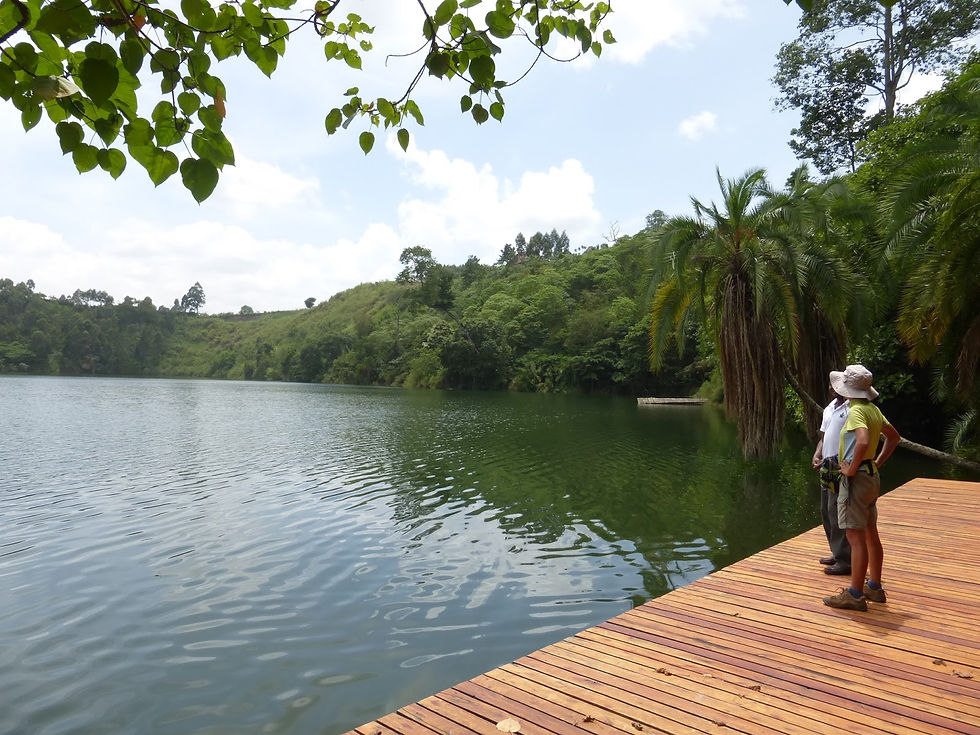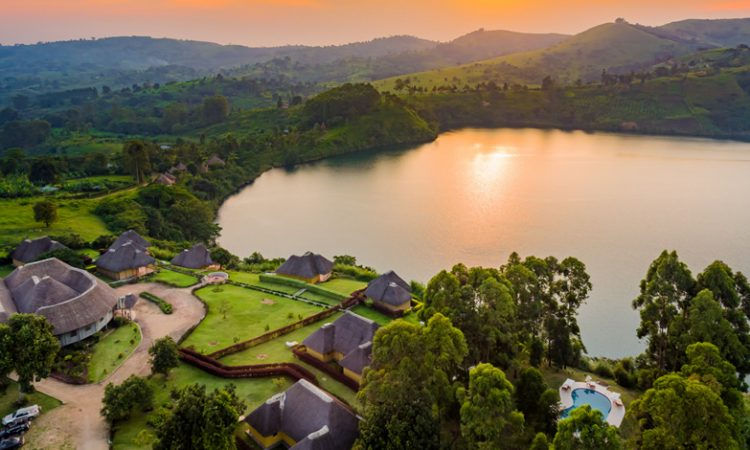
Fort Portal
2025 Guide to Fort Portal
Nestled in the lush highlands of western Uganda, Fort Portal is the vibrant capital of Kabarole District, often hailed as the “Tourism Capital of Uganda” for its proximity to pristine national parks and scenic landscapes. Located 320km (5-6 hours’ drive) from Kampala and 26km from Kibale National Park, this charming town sits at 1,523m elevation, offering a cool climate and stunning views of the Rwenzori Mountains. Home to the Batooro people and their Toro Kingdom, one of Uganda’s oldest monarchies, Fort Portal blends rich cultural heritage with natural attractions like the Ndali-Kasenda crater lakes, Amabere Caves, and access to chimpanzee trekking in Kibale. With a population of approximately 60,000 (2020 estimate), Fort Portal is a lively hub for adventure, relaxation, and cultural immersion. This guide covers everything you need to plan your visit, from activities and accommodations to dining and conservation efforts.
fort portal
2025 Guide to Fort Portal
Nestled in the lush highlands of western Uganda, Fort Portal is the vibrant capital of Kabarole District, often hailed as the “Tourism Capital of Uganda” for its proximity to pristine national parks and scenic landscapes. Located 320km (5-6 hours’ drive) from Kampala and 26km from Kibale National Park, this charming town sits at 1,523m elevation, offering a cool climate and stunning views of the Rwenzori Mountains. Home to the Batooro people and their Toro Kingdom, one of Uganda’s oldest monarchies, Fort Portal blends rich cultural heritage with natural attractions like the Ndali-Kasenda crater lakes, Amabere Caves, and access to chimpanzee trekking in Kibale. With a population of approximately 60,000 (2020 estimate), Fort Portal is a lively hub for adventure, relaxation, and cultural immersion. This guide covers everything you need to plan your visit, from activities and accommodations to dining and conservation efforts.

FORT PORTAL's Attractions and Activities
Ndali-Kasenda Crater Lakes
Just 15-30km from Fort Portal, the Ndali-Kasenda crater lakes are a collection of over 20 volcanic lakes, formed 8,000-10,000 years ago, offering breathtaking scenery. Lakes like Nyinambuga, Nkuruba, and Lyantonde are bilharzia-free, ideal for swimming, kayaking ($10-$20), and hiking ($15-$30). Guided tours visit viewpoints like the “Top of the World” trail, with panoramic Rwenzori views. Birdwatching (e.g., black-and-white casqued hornbill) and community visits to Batooro villages enhance the experience. Book through Ndali Lodge or Habari Uganda Tours.
Kibale National Park
Located 26km (30 minutes) from Fort Portal, Kibale National Park is the “Primate Capital of the World,” hosting over 1,500 chimpanzees and 13 primate species. Chimpanzee trekking ($250) and habituation experiences ($300) offer 90%+ sighting rates. The nearby Bigodi Wetland Sanctuary ($20-$40) features 138 bird species and community-led walks. Fort Portal is the ideal base for day trips or overnight stays, with operators like Brilliant Uganda arranging transfers.
Amabere Caves
The Amabere Caves, 8km from Fort Portal in Nyakasura, are a cultural and geological wonder, featuring stalactites and stalagmites resembling breasts, linked to the Toro Kingdom legend of Princess Nyinamwiru. Guided tours ($10-$20, 1-2 hours) include hiking to Nyakasura Falls and birdwatching (e.g., African emerald cuckoo). The caves are a sacred Batooro site, offering cultural insights. Combine with a crater lake visit for a half-day adventure.
Tooro Botanical Gardens
In Fort Portal Town, the Tooro Botanical Gardens (2.5 hectares) is a serene spot for plant lovers, showcasing 80+ tree species, medicinal herbs, and organic farming. Guided walks ($5-$15) highlight conservation efforts and Batooro herbal medicine. The gardens host community workshops and birdwatching (e.g., speckled mousebird), making it a relaxing urban escape. Book via the gardens’ office or Fort Portal Tours.
Toro Palace and Karaambi Royal Tombs
Perched on Kabarole Hill, the Toro Palace is the residence of King Oyo Nyimba, one of the world’s youngest monarchs, crowned at age three in 1995. Guided tours ($10-$20) explore the palace grounds, offering views of Fort Portal and Batooro history. The nearby Karaambi Royal Tombs, burial site of Toro kings, provide cultural depth with storytelling and artifacts. Respect royal protocols during visits, arranged by Fort Portal Tours.
Bird Watching
Fort Portal’s forests, wetlands, and crater lakes host over 200 bird species, including Albertine Rift endemics like the white-naped pigeon and green-breasted pitta. Top spots include Bigodi Wetland (26km), Tooro Botanical Gardens, and Lake Nkuruba. Guided birding tours ($20-$50) through Habari Uganda Tours are best during wet seasons (March-May, September-November) for migratory birds. Binoculars are essential for spotting rarities.
Cultural & Community Visits
Immerse yourself in Batooro culture through village tours ($10-$30) in Nyakasura or Bigodi, organized by the Kibale Association for Rural and Environmental Development (KAFRED). Learn about coffee farming, basket weaving, and the entogoro dance. Women’s groups like Ride 4 a Woman offer craft workshops and cycling tours ($15-$30), supporting community empowerment. Cooking classes ($10-$20) teach Batooro dishes like matoke with groundnut sauce.


.webp)
_JPG.jpg)


How to Get to FORT PORTAL
Fort Portal is accessible by air, road, or public transport.
-
By Air: Charter flights from Entebbe or Kajjansi to Ndali Airstrip (1 hour, $200-$400 one-way) via Aerolink Uganda, followed by a 20-minute drive to town. Kasese Airstrip (1 hour drive) is an alternative.
-
By Road: From Kampala, the 320km northern route via Mubende (5-6 hours) is fully tarmacked. From Mbarara, it’s 200km (3-4 hours); from Kigali, Rwanda, it’s 350km (6-7 hours) via Katuna. A 4x4 is advised for wet seasons or crater lake roads. Guided transfers cost $100-$250.
-
Public Transport: Buses from Kampala to Fort Portal (e.g., Link Bus, Kalita) cost UGX 15,000-25,000 ($4-$7), taking 5-6 hours. Taxis or boda-bodas to Kibale or crater lakes cost UGX 10,000-20,000 ($3-$5). Fort Portal Tours offers shuttles ($15-$30).
-
Visa Requirements: Uganda visas ($50) are available online or on arrival. The $100 East African Tourist Visa covers Uganda, Rwanda, and Kenya. Carry a yellow fever vaccination certificate.
-
Access Points: Fort Portal Town is the hub, with Boma Grounds and Main Street hosting tour operators. Kibale’s Kanyanchu (26km) and crater lakes (15-30km) are easily reached.
BEST TIME TO VISIT
Fort Portal’s highland climate (1,500m) ensures mild weather year-round.
-
Dry Seasons (January-February, June-July): Ideal for chimpanzee trekking, hiking, and lake activities, with clear skies and dry trails. June-July is peak season; book 3-12 months ahead. Temperatures range from 18-26°C (64-79°F).
-
Wet Seasons (March-May, September-November): Lush greenery and excellent birdwatching, with fewer crowds. April is wettest (150mm rain), but activities continue. May and December offer balanced conditions.
Park Fees and Permits
Fees vary by attraction, with park fees managed by UWA.
-
Kibale National Park: $40/day (non-residents), $250/$300 for chimpanzee trekking/habituation.
-
Bigodi Wetland Sanctuary: $20-$40 per person.
-
Ndali-Kasenda Crater Lakes: Hiking/kayaking ($10-$30), no entry fee.
-
Amabere Caves/Toro Palace: $10-$20 per person.
-
Tooro Botanical Gardens: $5-$15 per person.
-
Birding/Cultural Tours: $10-$50 per person.
WHERE TO STAY
Fort Portal offers diverse accommodations in town and near attractions.
-
Luxury: Mountains of the Moon Hotel (Boma Grounds) provides upscale rooms with Rwenzori views ($100-$200/night). Ndali Lodge (crater lakes) offers boutique cottages ($150-$300).
-
Mid-Range: Fort Motel and Koi Koi Cultural Village offer cozy rooms ($40-$80). Kluge’s Guest Farm (near Bigodi) provides serene stays ($50-$100).
-
Budget: Tabebuia Resort and Yes Hostel provide dorms or simple rooms ($10-$30). UWA Campsites at Kibale’s Kanyanchu cost $5-$10/person.
-
Community-Based: Batooro homestays in Nyakasura or Bigodi, arranged by KAFRED, offer cultural immersion ($10-$20).
Book early for dry seasons. Most include meals, Wi-Fi, and activity transfers.
.webp)

DINING AT FORT PORTAL
Dining in Fort Portal blends Batooro cuisine with international options, often enjoyed with views of crater lakes or tea estates. At Mountains of the Moon Hotel, savor matoke (steamed bananas), luwombo (stew in banana leaves), and grilled tilapia from nearby lakes, paired with Fort Portal’s renowned tea ($5-$15). Budget eateries on Main Street serve rolex (egg-chapati roll) and posho (maize porridge) for $1-$3. Ndali Lodge offers farm-to-table meals with robusta coffee, a regional staple. Bigodi community tours include Batooro dishes like smoked fish or groundnut stew. Local markets sell fresh avocados and bananas. Most restaurants accommodate vegetarian, vegan, or gluten-free diets with advance notice, ensuring a taste of Uganda’s highland cuisine.
Packing List & Preparation
Prepare for highland and rainforest activities.
-
Clothing: Lightweight long-sleeved shirts, trousers, swimsuit (for lakes), rain jacket, sturdy shoes, warm layers for cool nights (10-15°C). Neutral colors for Kibale treks.
-
Gear: Binoculars, camera, insect repellent, sunscreen, reusable water bottle, daypack, trekking poles for Kibale.
-
Health: Yellow fever vaccination (required), malaria prophylaxis, personal medications, first aid kit. Moderate fitness for trekking; light for lake activities.
-
Other: Cash (USD/UGX) for tips ($5-$15 for guides), souvenirs (e.g., Batooro crafts), permit confirmations, passport.
Boda-bodas are common but bumpy; use lodge shuttles for safety.
Safety & Conservation
Fort Portal is safe with robust tourism measures.
-
Safety: UWA rangers escort Kibale treks, and police patrol Fort Portal Town. The area is stable, with medical facilities available. Avoid night walks in town due to petty theft risks.
-
Environmental Health: Avoid littering at crater lakes to protect ecosystems. Lakes like Nyinambuga are bilharzia-free, but confirm safe swimming spots.
-
Conservation: Kibale fees fund chimpanzee and forest conservation. Community projects like KAFRED and Ride 4 a Woman support education and reforestation. Tooro Botanical Gardens promote sustainable farming. Respect cultural sites like Toro Palace to preserve Batooro heritage.



FAQ
What is the best time to visit FORT PORTAL?
Dry seasons (January-February, June-July) for trekking and lake activities; wet seasons (March-May, September-November) for birdwatching.
How much are Kibale permits?
$250 for chimpanzee trekking, $300 for habituation (non-residents).
Is Fort Portal safe?
Yes, with police patrols and ranger escorts. Avoid night walks in town.
What makes Fort Portal unique?
Its proximity to Kibale, crater lakes, and Toro Kingdom heritage, blending nature and culture.
Is Lake Bunyonyi near Fort Portal?
No, Lake Bunyonyi is 6 hours away near Kabale. Fort Portal’s lakes are the Ndali-Kasenda crater lakes.

